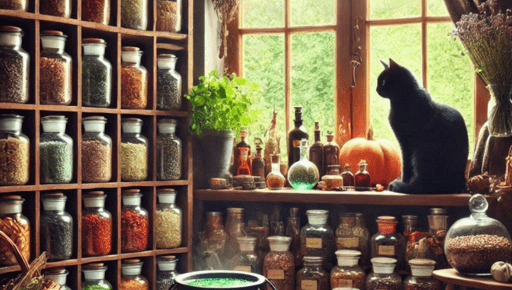
Introduction
A witchy apothecary is a personal collection of herbs, tinctures, and natural remedies curated to support holistic health and well-being. It embodies the ancient practice of herbalism, blending traditional wisdom with modern techniques to create powerful healing solutions. Creating a home apothecary invites you to connect with nature and craft personalised remedies tailored to your unique needs.
Having your own apothecary at home offers numerous benefits:
- Convenience: Access to natural remedies whenever needed.
- Personalisation: Tailor preparations according to specific health goals.
- Empowerment: Gain knowledge and confidence in using herbal medicine.
This article will guide you through the process of establishing your own witchy apothecary. It covers the historical context of apothecaries, essential ingredients and tools, as well as organisational tips. You’ll also explore medicinal preparations, build a knowledge base with reference materials, and embrace sustainable practices in your herbal journey.
Understanding the Concept of an Apothecary
The traditional apothecary has a rich history dating back centuries, serving as a cornerstone for communities in need of medicinal remedies. These early apothecaries were akin to today’s pharmacies, where skilled practitioners would prepare and dispense herbal concoctions tailored to individual needs. They played a pivotal role in health care, utilising knowledge passed down through generations.
The Transition from Traditional to Modern Practices
As time progressed, there was a transition from these traditional practices to more modern methodologies. The advent of pharmaceutical companies and mass-produced medicines changed the landscape significantly. Nonetheless, the essence of an apothecary lives on in a modern home apothecary, where individuals can reclaim the art of crafting personalised remedies.
The Benefits of Creating a Home Apothecary
Creating a home apothecary allows for customisation that caters specifically to personal preferences and health goals. This personalisation is key in adapting ancient practices to suit contemporary lifestyles. By selecting specific herbs and ingredients, you can tailor-make salves, tinctures, and other preparations that resonate with your unique needs and desires.
Empowering Yourself through Natural Remedies
The shift towards a home-based approach not only honours traditional wisdom but also empowers you to take control of your own well-being. Embracing this practice brings a sense of connection to nature and self-care that echoes the original purpose of apothecaries throughout history.
For those interested in delving deeper into this fascinating subject, this beginner’s guide provides valuable insights into understanding apothecaries, their history, and modern practices.
Stocking Your Apothecary with Essential Ingredients
Creating a witchy apothecary at home begins with stocking essential ingredients that form the foundation of your herbal explorations. Versatile staple items are crucial, providing flexibility and a broad array of uses in various herbal preparations.
Essential Dried Herbs for Beginners
Here are some dried herbs that every beginner should consider adding to their apothecary:
- Chamomile: Known for its calming properties, chamomile is perfect for teas or soothing balms. Starting with about 100 grams can give you enough to experiment with multiple recipes.
- Calendula: This herb is excellent for skin applications, owing to its anti-inflammatory benefits. A similar quantity of 100 grams is recommended to start.
- Lavender: A staple in any witchy apothecary for its relaxing scent and multipurpose use in teas, oils, and sachets. Consider beginning with 50 grams.
- Rosemary: Ideal for hair treatments and culinary uses alike; starting with 50 grams offers a good balance between experimentation and consumption.
Sourcing Quality Ingredients for Your Witchy Apothecary
Finding reputable suppliers is pivotal in ensuring the quality of your dried herbs. Here are some ways you can source quality ingredients:
- Local Markets: Visit local markets where you can find fresh options and personally assess the appearance and scent of the herbs.
- Farmers Markets: Explore farmers markets like those at Kawana or Noosa, which are excellent venues to discover fresh herbs.
- Online Stores: Look for online platforms that emphasise ethical sourcing and transparency about their products’ origins.
When purchasing online, make sure to check reviews and certifications to ensure credibility.
Tips for Growing Your Own Herbs at Home
Home gardening not only assures a consistent supply but also deepens your connection with the plants you use. Here are some tips for growing your own herbs:
- Basil: Thrives indoors on sunny windowsills; requires regular watering but is otherwise low-maintenance.
- Mint: Prefers partial shade and moist soil; be mindful as it spreads rapidly if not contained.
Investing time in learning about the specific needs of each plant ensures successful cultivation.
Assessing the Quality of Herbs
Quality assessment hinges on both appearance and scent:
- Appearance: Look for vibrant colours indicating freshness—dull or faded hues suggest age or improper storage.
- Scent: Fresh herbs should have a strong, distinct aroma. If you detect any mustiness or lack of fragrance, it’s best to avoid using these herbs in your preparations.
Building a well-stocked witchy apothecary requires attention to detail—from selecting versatile ingredients to ensuring their quality through careful sourcing and cultivation. This foundational step sets the stage for creating potent and personalised herbal remedies at home.
Exploring Different Medicinal Preparations in Herbalism
Herbalism offers a diverse range of medicinal preparations, each serving unique purposes and benefits. Tinctures and infused oils are among the most popular forms. Tinctures are liquid extracts made from herbs soaked in alcohol or vinegar for extended periods. They provide a potent method of delivering herbal benefits by concentrating the active compounds. Infused oils, on the other hand, involve steeping herbs in carrier oils to extract their essence, often used for topical applications.
Step-by-Step Guide for Making Tinctures and Glycerites at Home
Creating tinctures at home can be both rewarding and straightforward:
- Select Your Herbs: Choose dried herbs like chamomile or calendula.
- Prepare the Jar: Fill a glass jar halfway with the herbs.
- Add Alcohol or Vinegar: Pour high-proof alcohol (like vodka) or apple cider vinegar over the herbs until they’re fully submerged.
- Seal and Store: Close the lid tightly and store the jar in a cool, dark place for 4-6 weeks, shaking occasionally.
- Strain and Store: Once ready, strain the liquid through a cheesecloth into a clean bottle.
Glycerites offer an alcohol-free alternative to tinctures using glycerine instead of alcohol:
- Follow similar steps as above but replace alcohol with vegetable glycerine.
Benefits of Herbal Teas as Remedies
Herbal teas present another simple yet effective remedy option. They leverage water’s natural properties to extract beneficial compounds from herbs. Whether you’re seeking relaxation with chamomile tea or digestive aid from peppermint, these teas offer soothing experiences paired with health benefits.
Harnessing the Power of Essential Oils in Your Apothecary
Essential oils hold significant roles in skincare and cleaning solutions due to their concentrated nature.
Role in Skincare and Cleaning Solutions
- Essential oils like lavender are cherished for their soothing properties, making them ideal for skin-related applications.
- Tea tree oil is renowned for its antimicrobial qualities, making it excellent for natural cleaning products.
Recommended Essential Oils to Include
- Lavender: Known for its calming effects.
- Tea Tree Oil: Valued for its antibacterial capabilities.
- Eucalyptus: Useful for respiratory relief.
Safety Tips for Using Essential Oils Effectively
Careful usage of essential oils is crucial:
- Always dilute essential oils with a carrier oil before skin application.
- Conduct patch tests to check for allergies.
- Avoid ingesting essential oils unless guided by a professional.
Harnessing these tools within your witchy apothecary not only enriches your herbal practices but also ensures safe and effective application across various needs.
Essential Tools for Creating Remedies in Your Witchy Apothecary
Venturing into the world of crafting your own remedies calls for a set of essential tools, each playing a crucial role in your witchy apothecary. At the heart of this toolkit lies the mortar and pestle. This timeless instrument is indispensable for grinding and blending herbs, releasing their potent properties and aromas. Its use not only connects you to ancient practices but also ensures a personalised touch to each concoction.
1. Mortar and Pestle: The Heart of Herbal Crafting
The mortar and pestle are essential tools for any herbalist. They allow you to grind and blend herbs, releasing their natural oils and fragrances. This process not only enhances the effectiveness of your remedies but also adds a personal touch to each creation.
2. Measuring Tools: The Key to Consistency
Accurate measurements stand as the backbone of successful preparations. Using precise measuring tools such as spoons and cups guarantees that your herbal blends maintain consistency and potency. These tools help avoid potential mishaps, ensuring safety and effectiveness in your creations.
3. Storage Jars: Preserving the Freshness
Storing your herbal products correctly is equally important. Opt for storage jars made from glass or high-quality plastic to preserve the integrity of your ingredients. Airtight lids are crucial for maintaining freshness and preventing contamination. Consider labelling each jar with details like the herb’s name, preparation date, and intended use to keep your apothecary organised.
Creating a well-equipped witchy apothecary involves more than just collecting herbs; it requires thoughtful selection of tools that support both creativity and precision in your craft. Embrace these essentials to enhance your magical journey in herbalism, ensuring each remedy is crafted with care and expertise.
Organising Your Witchy Apothecary Like a Pro
Creating an efficient system for organising your apothecary is essential to maintaining the magical flow of your herbal practice. Here are some best practices to consider:
1. Categorise Your Ingredients and Preparations
Divide your herbal ingredients into categories such as dried herbs, tinctures, balms, and essential oils. This not only streamlines your workflow but also ensures that each item is easily accessible when you need it.
2. Dedicated Spaces
Consider designing specific areas within your apothecary for different products. For example, allocate shelves or drawers specifically for tinctures, while using another section for balms. This separation aids in preventing cross-contamination and maintains the purity of each item.
3. Effective Storage Solutions
Utilise airtight containers and dark glass jars to preserve the potency of your herbs and prevent degradation from light exposure. Mason jars, amber bottles, and tins are all excellent options for storage.
4. Innovative Labelling Systems
Implement a clear labelling system to identify each item effortlessly. Use waterproof labels or chalkboard tags to ensure durability. Including details like the name, date of preparation, and intended use will make your witchy potions easy to manage.
An organised apothecary is more than just pleasing to the eye; it significantly enhances functionality and efficiency in your herbal endeavours. By incorporating these strategies, you create a seamless environment where creativity and magic can truly flourish.
Building a Knowledge Base: Herbal Reference Materials You Need
Having reliable reference materials on herbalism by your side is essential for anyone looking to delve deeper into the world of natural potion making. These resources not only provide a wealth of knowledge but also ensure that your practices are safe and effective.
Must-Have Books on Herbal Medicine and Potion-Making Techniques:
- “The Complete Herbal Tutor” by Anne McIntyre: This book offers an extensive guide to using herbs for health and wellbeing, making it an excellent choice for both beginners and seasoned practitioners.
- “The Herbal Medicine-Maker’s Handbook” by James Green: A practical guide packed with step-by-step instructions on creating various herbal concoctions, from tinctures to salves.
- “Cunningham’s Encyclopedia of Magical Herbs” by Scott Cunningham: Ideal for those interested in the magical aspects of herbs. This book explores the lore and uses of over 400 herbs.
Benefits of Keeping a Recipe Journal:
Tracking your recipes and observations in a dedicated recipe journal offers several advantages:
- Personalisation: Documenting your experiences allows you to tailor recipes to suit your needs and preferences better.
- Learning from Mistakes: Recording what works—and what doesn’t—helps refine your skills over time.
- Inspiration Source: A well-maintained journal serves as a source of inspiration, sparking creativity in future projects.
By incorporating these resources into your practice, you enrich your knowledge base, supporting both the scientific and mystical aspects of herbalism.
Additionally, exploring the surprising benefits of Carbon 60 could offer valuable insights into how certain herbal components can enhance health through their powerful antioxidant properties among other benefits.
Embracing Sustainability in Your Herbal Practice
The importance of ethical sourcing and sustainability practices in your witchy apothecary cannot be overstated. Using ethically sourced ingredients ensures that you are contributing positively to the environment and supporting fair trade practices. This approach not only benefits the planet but also enhances the energy and effectiveness of your herbal creations.
Integrating locally sourced ingredients into your apothecary offers several advantages:
- Quality Assurance: Local products often come with a guarantee of freshness and quality. Knowing where your herbs are grown allows for better control over their purity and potency.
- Supporting Local Economies: By purchasing from local farmers or markets, like those at Kawana Farmers Markets or Yandina Country Markets, you are supporting small businesses and contributing to community growth.
- Reducing Carbon Footprint: Procuring ingredients locally reduces the need for long-distance transportation, thereby minimising carbon emissions associated with shipping.
Adopting these sustainable practices aligns with a holistic approach to wellness. It resonates with the natural cycles of life, promoting harmony between your apothecary and the world it inhabits. The commitment to ethical sourcing elevates your creations, transforming them into gifts that nurture both body and spirit while respecting Mother Earth.




